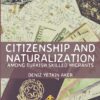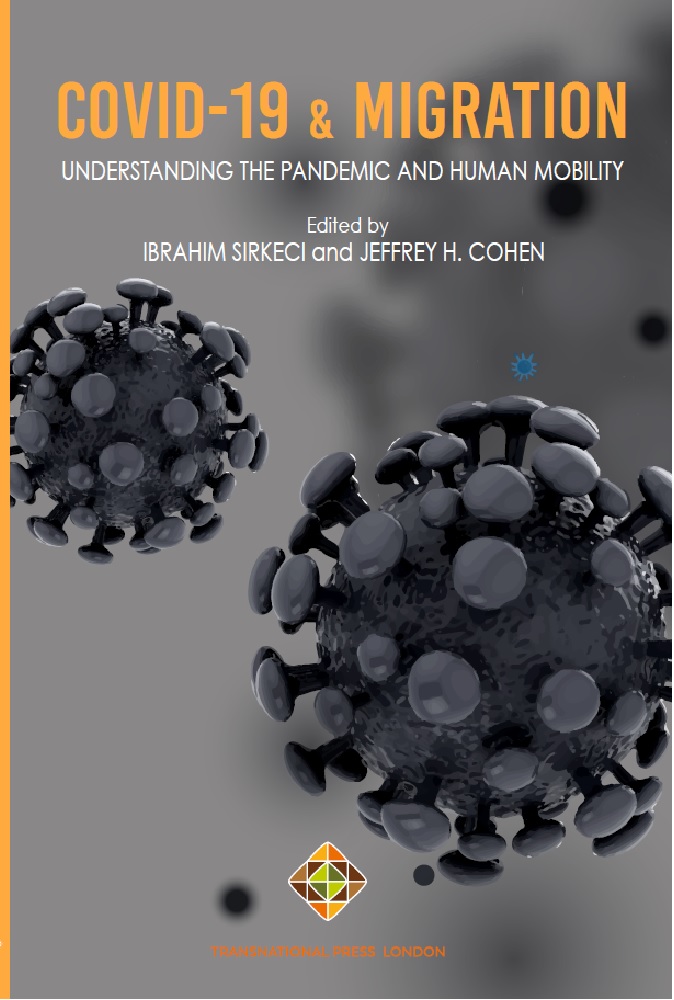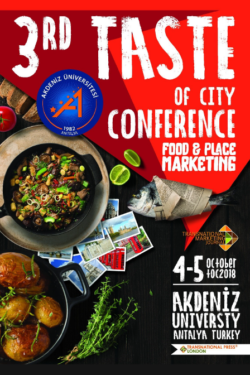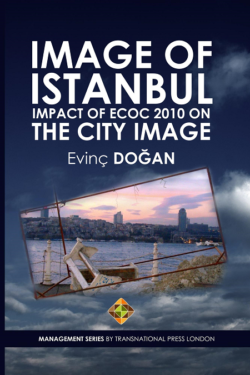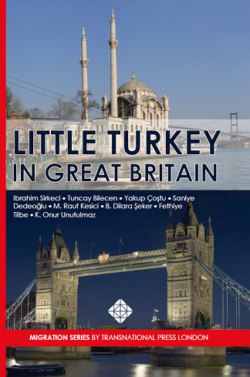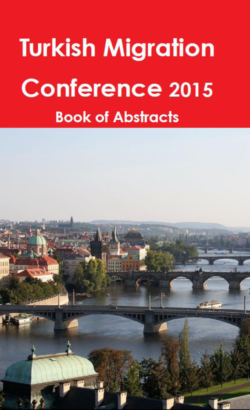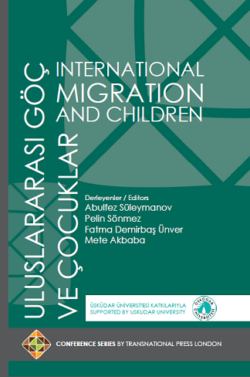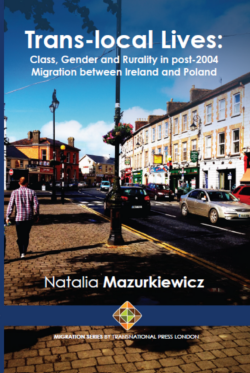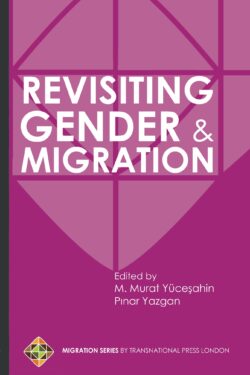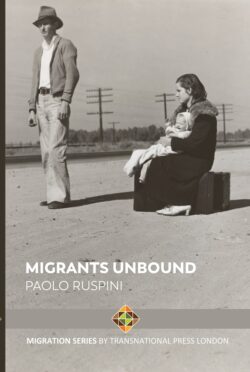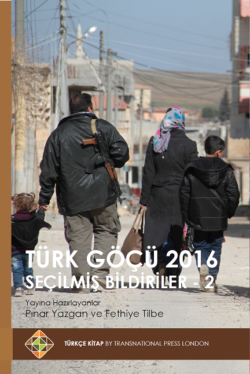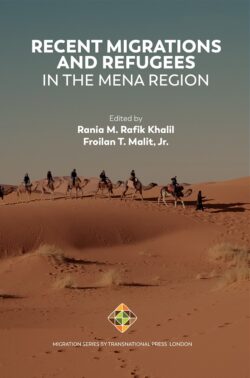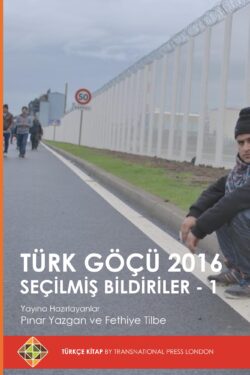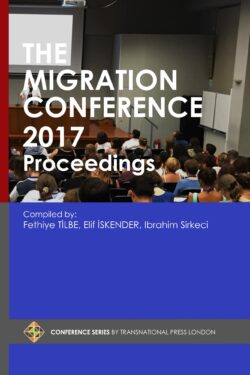COVID-19 and Migration
£24.50 – £34.50
COVID-19 and Migration: Understanding the Pandemic and Human Mobility Edited By Ibrahim Sirkeci and Jeffrey H. Cohen | Published: 11 November 2020 [Migration Series: 23] | Paperback: ISBN: 978-1-912997-59-6 | Buy at Amazon | Buy at Talebe.com | Hardcover: ISBN: 978-1-912997-71-8 | Buy at Lulu | Digital: ISBN: 978-1-912997-60-2 | Read Kindle version | Read on GooglePlay | Read on CEEOL | Read on Kortext | Read on Talebe.com
Description
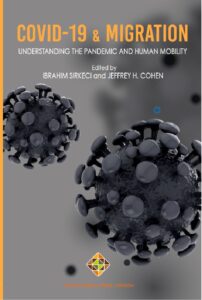
COVID-19 and Migration: Understanding the Pandemic and Human Mobility
Edited By Ibrahim Sirkeci and Jeffrey H. Cohen
Published: 11 November 2020 [Migration Series: 23] | View Book launch webinars on YouTube
Paperback: ISBN: 978-1-912997-59-6 | Buy at Amazon | Buy at Talebe.com
Hardcover: ISBN: 978-1-912997-71-8 | Buy at Lulu
Digital: ISBN: 978-1-912997-60-2 | Read Kindle version | Read on GooglePlay | Read on CEEOL | Read on Kortext | Read on Talebe.com
The COVID-19 pandemic has disrupted every domain of life. Migration and human mobility in general are not exceptions. Since March 2020, researchers, policy makers and many others have channelled their efforts to understand this new coronavirus, its impact and prospects. Many scholars were thinking and writing on the pandemic from its onset and many blog essays quickly appeared. One of the earliest peer-reviewed research articles Sirkeci and Yucesahin (2020) is reproduced here. This article and its focus on mobility and travel data showed that it was possible to predict the spatial spread and concentration of COVID-19 cases. Not only was this finding crucial to developing appropriate policies and strategies to counter the spread of the virus, it reminded us that the pandemic is a social disease and not simply a biological threat. The contributions in this book should be considered in this regard tackling the social and policy aspects as we leave the biological and medical side to the experts.
“Covid-19 introduces new uncertainties for everyone. For agriculture, the longer term effects of the pandemic include faster mechanization, more guest workers, and rising imports. Responses are likely to vary by commodity and be shaped by government policies.”
– Philip L Martin, Professor Emeritus, University of California, Davis, USA
“The COVID-19 pandemic reminds us of just how many people across the world rely on mobility for their livelihood: taxi drivers, delivery workers, street vendors, maintenance technicians of long-distance operation systems, all employees in the hospitality sector… not forgetting the most vulnerable at this time, the homeless, beggars and street kids, especially in the global South, who have to move from place to place to get food, to find a place to sleep through the night, and to run away from police.”
– Biao Xiang, Professor of Anthropology, University of Oxford, UK
Contents
- CHAPTER 1. INTRODUCTION – Ibrahim Sirkeci and Jeffrey H. Cohen
- CHAPTER 2. COVID-19 AND INTERNATIONAL LABOUR MIGRATION IN AGRICULTURE – Philip L. Martin
- CHAPTER 3. HOSTAGES OF MOBILITY: TRANSPORT, SECURITIZATION AND STRESS DURING PANDEMIC – Biao Xiang
- CHAPTER 4. MODELING AND PREDICTION OF THE 2019 CORONAVIRUS DISEASE SPREADING IN CHINA INCORPORATING HUMAN MIGRATION DATA – Choujun Zhan, Chi Kong Tse, Yuxia Fu, Zhikang Lai, Haijun Zhang
- CHAPTER 5. THE STUDY OF THE EFFECTS OF MOBILITY TRENDS ON THE STATISTICAL MODELS OF THE COVID-19 VIRUS SPREADING – David Gondauri and Mikheil Batiashvili
- CHAPTER 6. HUMAN MOBILITY, COVID-19 AND POLICY RESPONSES: THE RIGHTS AND CLAIMS-MAKING OF MIGRANT DOMESTIC WORKERS – Smriti Rao, Sarah Gammage, Julia Arnold and Elizabeth Anderson
- CHAPTER 7. ‘UNWANTED BUT NEEDED’ IN SOUTH AFRICA: POST PANDEMIC IMAGINATIONS ON BLACK IMMIGRANT ENTREPRENEURS OWNING SPAZA SHOPS – Sadhana Manik
- CHAPTER 8. LABOUR MARKET AND MIGRATION OUTCOMES OF THE COVID-19 OUTBREAK IN MEXICO – Carla Pederzini Villarreal and Liliana Meza González
- CHAPTER 9. REFLECTIONS ON COLLECTIVE INSECURITY AND VIRTUAL RESISTANCE IN THE TIME OF COVID-19 IN MALAYSIA – Linda Alfarero Lumayag, Teresita C. Del Rosario and Frances S. Sutton
- CHAPTER 10. FACING A PANDEMIC AWAY FROM HOME: COVID-19 AND THE BRAZILIAN IMMIGRANTS IN PORTUGAL – Patricia Posch and Rosa Cabecinhas
- CHAPTER 11. MIGRATION AND IMMIGRATION: UGANDA AND THE COVID-19 PANDEMIC – Agnes Igoye
- CHAPTER 12. IMPACT OF COVID-19 HUMAN MOBILITY RESTRICTIONS ON THE MIGRANT ORIGIN POPULATION IN FINLAND – Natalia Skogberg, Idil Hussein and Anu E Castaneda
- CHAPTER 13. REMITTANCES FROM MEXICAN MIGRANTS IN THE UNITED STATES DURING COVID-19 – Rodolfo García Zamora and Selene Gaspar Olvera
- CHAPTER 14. THE COVID-19, MIGRATION AND LIVELIHOOD IN INDIA: CHALLENGES AND POLICY ISSUES – R.B. Bhagat, Reshmi R.S., Harihar Sahoo, Archana K. Roy, Dipti Govil
- CHAPTER 15. THE FUTURE OF MOBILITY IN A POST PANDEMIC WORLD: FORCED MIGRATION AND HEALTH – Monette Zard and Ling San Lau
- CHAPTER 16. MULTILATERALISM FOR MOBILITY: INTERAGENCY COOPERATION IN A POST-PANDEMIC WORLD – Daniel Naujoks
- CHAPTER 17. COVID-19, REMITTANCES AND REPERCUSSIONS – Melissa Siegel
About the Editors
Ibrahim Sirkeci, PhD, is Professor of Transnational Studies and Marketing, Head of Marketing Subject Cluster, Interim Assistant Dean for Research, Leader of PhD Programme and Director of Centre for Transnational Business and Management at Regent’s University London, UK. His research focuses on migration, insecurity, labour markets and remittances in the UK, Turkey, Iraq, and Germany. He has authored and edited many books and leads many journals including Migration Letters and Remittances Review. Ibrahim is also the chair of The Migration Conferences (TMC).
Jeffrey H. Cohen, PhD, is a professor of anthropology at The Ohio State University. His research on migration and economic development in Mexico, the Dominican Republic, Turkey and China includes support from the National Science Foundation, National Geographic Society, the Fulbright program. His books include The Cultures of Migration: The Global Nature of Contemporary Movement (2011) written with Ibrahim Sirkeci and named an outstanding title by Choice Reviews for 2012 and Eating Soup without a Spoon: Anthropological Theory and Method in the Real World (2015). He is co-editor of the journals Migration Letters and Remittance Reviews and is completing The Culture of Migration Handbook to be published in 2021by Edward Elgar.

About the Chapter Authors
Elizabeth J. Anderson is a research specialist at the International Center for Research on Women. She studies gender, health behaviour, and violence epidemiology.
Julia Arnold is Senior Director, Gender and Financial Inclusion at the Center for Financial Inclusion. She leads research on gender transformative approaches to women’s financial inclusion.
Mikheil Batiashvili is based at Business and Technology University, Tbilisi, Georgia.
R. B. Bhagat is Professor and Head, Department of Migration and Urban Studies, International Institute for Population Sciences, Mumbai, India. He is also the Chief Editor of Demography India, an official journal of the Indian Association for the Study of Population (IASP).
Rosa Cabecinhas, Universidade do Minho, Communication Science Department, ICS, Portugal.
Anu E Castaneda is Research Manager at Finnish Institute for Health and Welfare. Her expertise includes cultural diversity, political science and social psychology, ethnic and intercultural relations, discrimination and integration, mental health and psychotherapy. She is chair of THL’s Expert Group for Cultural Diversity (MONET).
Teresita C. Del Rosario has a background in Sociology from Maryknoll College in the Philippines. She pursued her graduate Studies in Public Administration from New York University, a second masters degree in Public Administration from the Harvard Kennedy School of Government, and a Master of Arts degree in Social Anthropology from the Harvard University Faculty of Arts and Sciences.
Yuxia Fu, Nanfang College of Sun Yat-Sen University, Guangzhou China.
Sarah Gammage is the Director of Policy and Government Relations for Latin America at the Nature Conservancy. She is a feminist economist and member of the International Association for Feminist Economics.
David Gondauri is Associate Professor at Business and Technology University, Tbilisi, Georgia.
Dipti Govil is Assistant Professor, Department of Population Policies and Programmes, International Institute for Population Sciences, Mumbai, India.
Idil Hussein is a researcher at the Unit for Infectious Disease Control and Vaccinations at the National Institute for Health and Welfare in Finland. She acts as an administrator of the National Infectious Disease Register.
Agnes Igoye is the Deputy National Coordinator Prevention of Trafficking in Persons, Ministry of Internal Affairs, Uganda. She leads efforts to prevent human trafficking through Uganda’s national taskforce.
Zikang Lai, Nanfang College of Sun Yat-Sen University, Guangzhou China.
Ling San Lau is a pediatric physician and senior program officer in the Program on Forced Migration and Health at Columbia University. Her research focuses on improving the health and protecting the rights of vulnerable populations, including children and families affected by conflict, communicable diseases, and forced displacement.
Linda Alfarero Lumayag is Program Coordinator and Senior Lecturer of Politics and Government Studies, Faculty of Social Sciences and Humanities, Universiti Malaysia Sarawak, Malaysia.
Sadhana Manik is associate professor in the Department of Geography Education at the University of KwaZulu-Natal in South Africa.
Philip L. Martin is Emeritus Professor in Agricultural Economics at the University of California, Davis, US. Philip is also the co-chair of the Migration Conferences (TMC) and Co-editor of Remittances Review.
Liliana Meza González is a senior economist at the Mexican National Institute of Statistics and Geography (INEGI) and a part-time professor at Universidad Iberoamericana in Mexico City, where she teaches at the Masters program on Migration Studies. She is a member of the Mexican National Research System.
Daniel Naujoks is the Interim Director of International Organization and UN Studies Specialization, Lecturer of International and Public Affairs at Columbia University. He is the author of Migration, Citizenship, and Development. Diasporic Membership Policies and Overseas Indians in the United States (2013, Oxford University Press).
Selene Gaspar Olvera is Researcher in the Academic Unit of Development Studies, Autonomous University of Zacatecas. She is also member of the Information System Project on Migration and Development (SIMDE-UAZ), Mexico.
Carla Pederzini Villareal is a Demographer and a full-time professor and researcher at Universidad Iberoamericana, where she teaches at the Masters program on Migration Studies. She served as President of the Mexican Demographic Society (SOMEDE) from 2013 to 2015 and is currently a member of the editorial committee Coyuntura Demográfica.
Patricia Posch, Universidade do Minho, Communication Science Department, ICS, Portugal.
Reshmi R.S. is Assistant Professor, Department of Migration and Urban Studies, International Institute for Population Sciences, Mumbai, India.
Harihar Sahoo is Assistant Professor, Department of Development Studies, International Institute for Population Sciences, Mumbai, India.
Smriti Rao is Professor, Economics and Global Studies at Assumption University, and Resident Scholar, Women’s Studies Research Center, Brandeis University. She studies the intersection of gender and class, particularly in the global South.
Archana K. Roy is Professor, Department of Migration and Urban Studies, International Institute for Population Sciences, Mumbai, India.
Melissa Siegel is a Professor of Migration Studies and Head of Migration Studies at the Maastricht Graduate School of Governance and UNU-MERIT where she manages several migration research projects, coordinates the Migration Studies Specialization as part of the Master’s Program in Public Policy and Human Development.
Natalia Skogberg is Research Manager at Finnish Institute for Health and Welfare. Her expertise includes migration and cultural diversity and asylum seekers and migrants health and wellbeing. She is a member of THL’s Expert Group for Cultural Diversity (MONET).
Frances S. Sutton is a Ph.D candidate in the Department of Anthropology at The Ohio State University. She received her BA in Anthropology from Kenyon College in Gambier, OH and her MA in Anthropology from The Ohio State University.
Chi Kong Tse, Department of Electronic Engineering, City University of Hong Kong, Hong Kong, China.
Biao Xiang is Professor of Social Anthropology and Fellow of St Hugh’s College at the University of Oxford, UK. He is the author of The Intermediary Trap (Princeton University Press, forthcoming) and Global “Body Shopping” (Princeton University Press, 2007; winner of 2008 Anthony Leeds Prize; Chinese by Peking University Press 2012).
Rodolfo García Zamora is Professor-Researcher in the Academic Unit of Development Studies, Autonomous University of Zacatecas, Zacatecas, Mexico.
Monette Zard is the Director of the Program on Forced Migration and Health and Allan Rosenfield Associate Professor of Forced Migration and Health, Heilbrunn Department of Population and Family Health, at Columbia University Mailman School of Public Health.
Choujun Zhan is Professor at School of Computer, South China Normal University, Guangzhou, China.
Haijun Zhang, Department of Computer Science, Harbin Institute of Technology, Shenzhen 518055, China.
CREDITS:
Cover Design: Nihal Yazgan
Cover Image: Black vector created by starline – www.freepik.com
Product Details:
Migration Series: 23
Paperback: ISBN: 978-1-912997-59-6
Hardcover: ISBN: 978-1-912997-71-8
Digital: ISBN: 978-1-912997-60-2
Publisher: Transnational Press London
Published: 11 November 2020
Language: English
Pages: 214
Binding: Perfect-bound Paperback | Hardback
Interior Ink: Black & white
Weight (approx.): 0.35 kg | 0.45 kg
Dimensions (approx.): 15.2cm wide x 22.9cm tall
Additional information
| Weight | 0.35 kg |
|---|---|
| Version | |
| Binding | Paperback, Hardcover |
| Interior Ink | Black and White |


